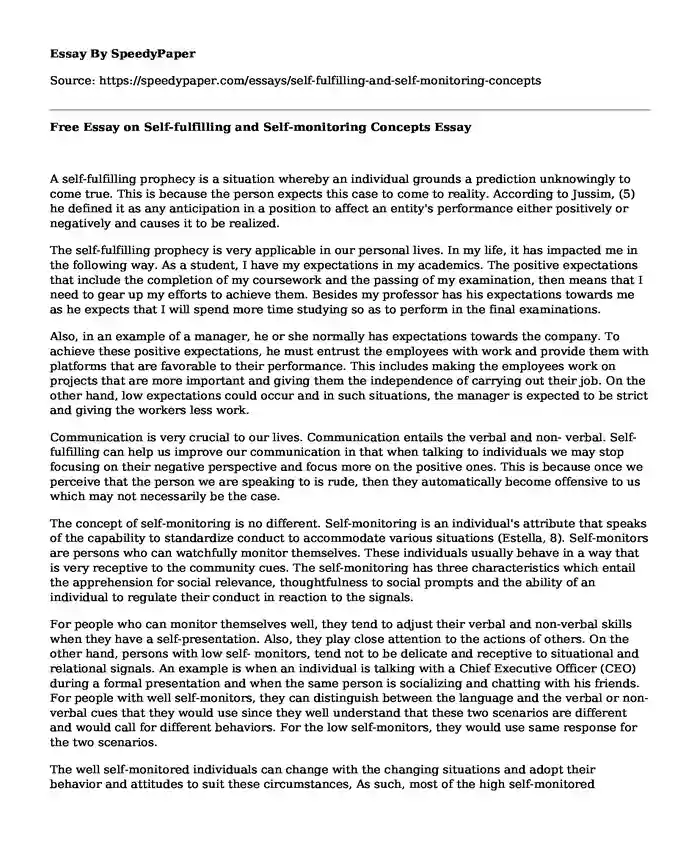
| Type of paper: | Essay |
| Categories: | Psychology Consciousness |
| Pages: | 3 |
| Wordcount: | 665 words |
A self-fulfilling prophecy is a situation whereby an individual grounds a prediction unknowingly to come true. This is because the person expects this case to come to reality. According to Jussim, (5) he defined it as any anticipation in a position to affect an entity's performance either positively or negatively and causes it to be realized.
The self-fulfilling prophecy is very applicable in our personal lives. In my life, it has impacted me in the following way. As a student, I have my expectations in my academics. The positive expectations that include the completion of my coursework and the passing of my examination, then means that I need to gear up my efforts to achieve them. Besides my professor has his expectations towards me as he expects that I will spend more time studying so as to perform in the final examinations.
Also, in an example of a manager, he or she normally has expectations towards the company. To achieve these positive expectations, he must entrust the employees with work and provide them with platforms that are favorable to their performance. This includes making the employees work on projects that are more important and giving them the independence of carrying out their job. On the other hand, low expectations could occur and in such situations, the manager is expected to be strict and giving the workers less work.
Communication is very crucial to our lives. Communication entails the verbal and non- verbal. Self-fulfilling can help us improve our communication in that when talking to individuals we may stop focusing on their negative perspective and focus more on the positive ones. This is because once we perceive that the person we are speaking to is rude, then they automatically become offensive to us which may not necessarily be the case.
The concept of self-monitoring is no different. Self-monitoring is an individual's attribute that speaks of the capability to standardize conduct to accommodate various situations (Estella, 8). Self-monitors are persons who can watchfully monitor themselves. These individuals usually behave in a way that is very receptive to the community cues. The self-monitoring has three characteristics which entail the apprehension for social relevance, thoughtfulness to social prompts and the ability of an individual to regulate their conduct in reaction to the signals.
For people who can monitor themselves well, they tend to adjust their verbal and non-verbal skills when they have a self-presentation. Also, they play close attention to the actions of others. On the other hand, persons with low self- monitors, tend not to be delicate and receptive to situational and relational signals. An example is when an individual is talking with a Chief Executive Officer (CEO) during a formal presentation and when the same person is socializing and chatting with his friends. For people with well self-monitors, they can distinguish between the language and the verbal or non-verbal cues that they would use since they well understand that these two scenarios are different and would call for different behaviors. For the low self-monitors, they would use same response for the two scenarios.
The well self-monitored individuals can change with the changing situations and adopt their behavior and attitudes to suit these circumstances, As such, most of the high self-monitored individuals often than not would be found taking on the managerial positions in the organizations and play different roles. They bring changes in the leadership style that is used to fit in a company's condition.
To conclude, having gone through the process of this assignment, I have learned that both the self-fulfilling concept and the self-monitoring concept are imperative in communication as they enable an individual to react according to the situations at hand. It is also important for individuals to recognize their self-monitoring style.
Work cited
Jussim, Lee J. Social Perception and Social Reality: Why Accuracy Dominates Bias and Self-Fulfilling Prophesy. New York: Oxford University Press, 2012. Print.
Estrella, Marisol. Learning from Change: Issues and Experiences in Participatory Monitoring and Evaluation. London, UK: Intermediate Technology Publications, 2000. Internet resource.
Cite this page
Free Essay on Self-fulfilling and Self-monitoring Concepts. (2019, Sep 16). Retrieved from https://speedypaper.com/essays/self-fulfilling-and-self-monitoring-concepts
Request Removal
If you are the original author of this essay and no longer wish to have it published on the SpeedyPaper website, please click below to request its removal:
- Free Essay: Chapter 2 of the Oral Delivery of Therapeutic Proteins and Peptides Research
- Literary Essay with the Analysis of Macbeth
- Free Essay on the Impact of National Culture on HRM Practices
- Criminal Justice and Racial Discrimination, Free Essay for You
- Free Paper with Some Questions in Architecture
- Paper Example on Factors That Influence Foreign Exchange Rates
- Negotiation Analysis for Disney and Fox Merger - Essay Sample
Popular categories




